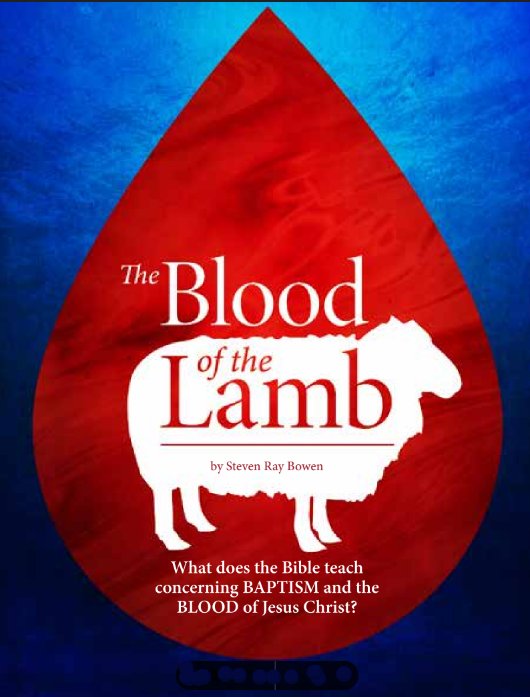
The journey you are about to take into the Word of God is one of the most important you will ever take. As we visit together, we will explore one of the greatest topics in God’s Word: God’s plan of salvation.
As important as the topic is, many people in the religious world, sadly, get it wrong. Satan somehow has found a way to hide the truth from many. Only a very few churches today teach the truth on the plan of salvation. That fact is alarming and amazing; it grabs our attention and compels us to look into these things further!
What we are addressing today is the greatest question in the Word of God. It’s the question men cry out on the day of Pentecost in Acts 2:37, “Men and brethren, what shall we do?” It’s the same question the jailor of Acts 16 poses as he steps from the edge of an unprepared eternity and seeks eternal life, saying, “Sirs, what must I do to be saved?” (Acts 16:30).
God’s Word gives us the answer to that eternal question with great detail, and we are determined here to find it.
Thank you for coming along on the search!
We begin our journey with the world’s greatest question: “What must I do to be saved?”
The answer to that question—in short—is this: We must reach the blood of Jesus.
How important is it for us to reach the blood of Jesus?
The Bible shows us over in the seventh chapter of Revelation when John travels by the Spirit to the portals of heaven. What he sees is amazing. He sees a great multitude standing “before the throne, and before the Lamb, clothed with white robes …” (v. 9).
One of the elders turns to John and asks, “Who are these arrayed in white robes …?” (v. 13, NKJV). John seems shocked by the question and answers, “Sir, you know.”
So the elder answers his own question: “These are they which came out of great tribulation, and have washed their robes, and made them white in the blood of the Lamb” (v. 14). We cannot afford to miss this: Those people in heaven—gathered around God’s throne and standing before the Lamb of God—are those whose robes were washed white in the blood of Jesus Christ!
With that powerful thought, we realize that we absolutely must find the truth to the question before us:
What must we do to make sure our robes are washed in the blood of Jesus?
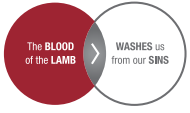
1
For centuries songwriters have exalted the soulcleansing power of the blood of Jesus in beautiful harmony.
In 1878 Elisha Hoffman penned the great hymn, “Are You Washed in the Blood?” Remember the great questions that openthe song?
Have you been to Jesus for the cleansing pow’r Are you washed in the blood of the Lamb? Are you fully trusting in his grace this hour? Are you washed in the blood of the Lamb?
What beautiful, soul-stirring questions!
A few years later, in 1899, Lewis Jones offers equally stirring questions in a familiar and powerful hymn:
Would you be free from the burden of sin? There’s pow’r in the blood, pow’r in the blood; Would you o’er evil a victory win? There’s wonderful pow’r in the blood.
The Apostle John, writing from the isle of Patmos, knew thatpower as well: “Unto him that loved us,” he writes, “and washed us from our sins in his own blood” (Revelation 1:5).
Paul—in his valedictory address to the elders of Ephesus— reminds them to feed the Lord’s church that “he hath purchased with his own blood” (Acts 20:28).
Then listen to the words of Jesus’ friend Peter:
Forasmuch as ye know that ye were not redeemed with corruptible things, as silver and gold, from your vain conversation received by tradition from your fathers; But with the precious blood of Christ, as of a lamb without blemish and without spot (1Peter 1:18-19).
Yes, there is redeeming, “wonder-working pow’r” in the blood of the Lamb!
2
We understand today that the blood of Jesus Christ has the power to give man what he was unable to attain for thousands of years! For four long millennia through millions of animal sacrifices that God ordained—man had searched and longed for redemption from his sins.
This search began way back in the garden when God provided a covering for man that would only suffice temporarily. God shed
the world’s first blood to cover Adam and Eve with the skins of animals (Genesis 3:21). That bloodshed covered man’s nakedness, but it could not cover his sin.
Under the Old Testament plan, God ordained blood sacrifices to serve as a temporary covering for sin. But those sacrifices the offered “year by year continually” (Hebrews 10:1) could not cleanse the people. If they could, says the apostle, they would have stopped being offered (v. 2).
Then he adds: “But in those sacrifices there is a remembrance again made of sins every year. For it is not possible that the blood of bulls and of goats should take away sins” (vs. 3-4).
The solution to the problem points directly to Jesus Christ, who did not have to offer sacrifices repeatedly.
“But this man,” the apostle explains, “after he had offered one sacrifice for sins for ever, sat down on the right hand of God … For by one offering he hath perfected for ever them that are sanctified”(vs. 12, 14).
You see, through Jesus Christ—through His soul-cleansing blood—we have a remedy so our sins andiniquities will be remembered no more (v. 17).
Oh, so many rivers of blood were shed through the centuries as man tried to remain in good standing with God! But despite millions of animal sacrifices and rivers of blood flowing through
3
Israel, this was not enough to redeem man. Each year those sins were recalled. Aren’t you glad today that sins of our past are not recalled every year, that we don’t have to face them again once we have come in contact with the soul cleansing blood of the Lamb? Not now. Not ever!
What a beautiful benefit we have—because of Calvary!
So, we come to the pivotal question: How do we reach that blood?
The Bible’s answer and our response to it will determine whether or not we walk in robes of white around God’s throne! That is how important this search is!
The issue, obviously, is too important to leave to man; so, let’s go to the inspired Word of God for the answer.
Let’s begin at the first gospel sermon, recorded in the second chapter of Acts. Before the Lord ascends back to heaven, He instructs the apostles to remain in Jerusalem until they are given
power from heaven (Luke 24:49).
Men from every nation gather in Jerusalem on that Pentecost day, watching and listening as the Holy Spirit falls miraculously on the apostles and as Peter stands up to deliver the first gospel
sermon (Acts 2:1-5).
Peter preaches a fiery, soul-stirring sermon that day to these Jews, alerting them that they were guilty of crucifying our Lord!
“Therefore,” he concludes, “let all the house of Israel know assuredly, that God hath made that same Jesus, whom ye have crucified, both Lord and Christ” (v. 36).
The response is overwhelming! The gospel cuts to the heart of thousands in the crowd, and they cry out to Peter and the rest of theapostles, “Men and brethren, what shall we do?” (v. 37).
4
This is the first time under the gospel plan that we have a record of this life-changing question: What must I do to be saved? It’s a momentous hour.
What is the answer Peter gives? What is it that those hearers were to do to reach the blood of Jesus? Peter answers, “Repent, and be baptized every one of you in the name of Jesus Christ for the remission of sins, and ye shall receive the gift of the Holy Ghost” (v. 38, emphasis added).
I don’t know if there’s a more power-packed scripture in all the Bible:
• Repent.
• Be baptized.
• For the forgiveness of sins.
• In the name (or by the authority) of Jesus Christ.
• To receive the gift of the Holy Spirit.
The first two statements are actions we are required to take. They are commands of the Lord: Repent and be baptized! For what purpose? To receive the remission of sins and the gift of the Holy Spirit.
According to the inspire apostle, both the forgiveness of sins andthe gift of the Holy Spirit come after baptism, not before. But if a manwill repen —turning from sin—and submit to baptism to have his sins washed away, he will reach the blood of Jesus Christ!
Let’s go to another scene—to the conversion of Saul of Tarsus— to make sure we harmonize the scriptures well.
Saul—on his way to Damascus to persecute Christians— sees a bright light and encounters the Lord. When he realizes that he is talking to the Lord, he responds just as the crowd does on the dayof Pentecost: “And he trembling and astonished said, Lord, whatwilt thou have me to do?” (Acts 9:6).
5
That question might seem strange to some who think that Saul has already done all he needed to do.
• He has had a “religious vision,” seeing a light (Acts 9:3)
• He sees and talks to the Lord (Acts 9:4); then, confesses his
faith in Jesus, calling him “Lord” (Acts 9:6).
• Finally, he asks that great question, “What wilt thou have me to do?” indicating his repentance (Acts 9:6).
If Saul walked into churches today and recounted his experience, most, no doubt, would grab Saul by the hand and say, “Welcome brother Saul; you’re a born-again Christian!”
But, amazingly, the Holy Spirit does not reveal that Saul is born again yet. In fact, the Bible shows that his sins are not yet washed away!
What an important discovery in our search! Seeing a vision,
believing in the Lord, confessing the Lord’s name, and even praying for three days—as Saul does—do not wash away a man’s sins!
We know that these acts do not remove sins because Jesus tells Saul to “Arise, and go into the city, and it shall be told thee what thou must do!” (Acts 9:6). Saul still needed to do something.
When he gets to Damascus, Ananias, a preacher sent by God, walks in the room as Saul is down on his knees praying, and says, “And now why tarriest thou? arise, and be baptized, and wash away thy sins, calling on the name of the Lord” (Acts 22:16, this is very importent) Saul still had sins that needed to be washed away. His soul was still stained! His robes had not yet been made white by the blood of the Lamb! He was not yet prepared to walk around the heavenly throne before God and our Lord Jesus Christ! But he would be soon, because Paul obeyed the heavenly command; he “arose, and was baptized” (Acts 9:18).
6

7
Years later, this same Saul, called Paul, writes a letter to Rome and vividly describes this process of having sins washed away by the blood of Jesus, thus putting a man into Christ:
How shall we, that are dead to sin, live any longer therein?
Know ye not, that so many of us as were baptized into Jesus Christ were baptized into his death? Therefore we are buried with him by baptism into death:that like as Christ was raised up from the dead by the glory of the Father, even so we also should walk in newness of life. For if we have been planted together in the likeness of his death, we shall be also in the likeness of his resurrection: Knowing this, that our old man is crucified with him, that the body of sin might be destroyed, that henceforth we should not serve sin. For he that is dead is freed from sin (Romans 6:2b-7,).
Notice the references to the death, burial, and resurrection. He says we are “dead to sin” (v. 2), “baptized into his death” (v. 3),
“buried with him by baptism into death” (v. 4), “raised up from the dead” (v. 4), and, then, we “walk in newness of life” (v. 4).
Then, Paul ties this great teaching all together in a beautiful conclusion in verse 17:
“But God be thanked, that ye were the servants of sin, but ye have obeyed from the heart that form of doctrine which was delivered you. Being then made free from sin, ye became the servants of righteousness”.
Paul says they had obeyed a “form” (i.e., a pattern) of doctrine, which, of course, is the pattern of our Lord’s death, burial, and resurrection (vs. 2-6).
How did they obey that pattern?
First, Paul says, by dying to sin (v. 2), then being “buried with
8
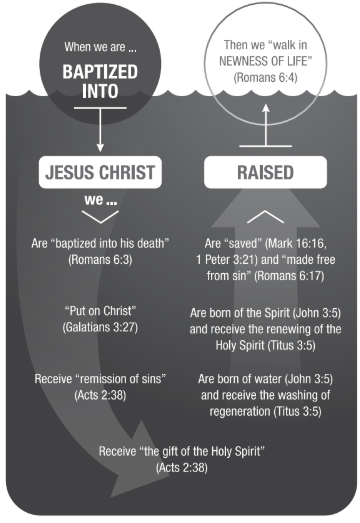
9
him by baptism” (v. 4), and, finally, being raised to “walk in newness of life” (v. 4).
The apostle says that when we obey that pattern we are “then made free from sin” (vs. 17-18, emphasis added).
We are not free from sin until then. But when we obey, our sins are washed away. When we are baptized, Paul says, we are “baptized into Jesus Christ … into his death” (v. 3). That is where “freedom from sin” is, in Christ. Certainly, we cannot be saved outside of our Lord.
So, then, how do we get into Christ? Paul says in Romans 6:3 that we are “baptized into Jesus Christ.” He teaches the same lesson to the Galatians, saying, “For as many of you as have been baptized into Christ have put on Christ” (Galatians 3:27, emphasis added).
We began our journey together with a search, and here is what we have found: The Lord offers no other means by which we get into Christ and no other means by which we reach His redeeming blood than by being baptized into Christ. Our obligation is to turn to Jesus Christ, and “arise, and be baptized, and wash away … [our] sins!”
Some of you may wonder, “What if I was baptized long ago in a denomination I attended?”
That’s an important question.
While many denominations baptize or immerse, few baptize for the remission of sins. Most churches baptize as a sign or token that one has been saved—that is, they claim that a man is saved at the point he decides to accept Jesus as his personal Savior. He then says the “sinner’s prayer,” and at some later point he may be baptized as a token of that salvation.
Such churches teach that the “sinner’s prayer” is the point of salvation, and then baptism comes later. So they do not baptize
10
for the remission of sins (Acts 2:38), a serious error in that it is different from the baptism of Acts 2:38; 22:16, and Romans 6.
If you were baptized under such a baptism, what should you do?
You should do what the men in Acts 19 do. There Paul finds
some men in Ephesus who have been baptized unto John’s baptism. They have never heard of scriptural baptism, so Paul immediately teaches them baptism in the name of Jesus.
Then, the scriptures report, “When they heard this, they were baptized in the name of the Lord Jesus” (Acts 19:5). (By the way, notice that baptism is immediate.)
The only baptism that is “in the name of the Lord Jesus” (i.e., by His authority) is baptism “in the name of Jesus Christ for the remission of sins.” The Lord authorizes no other baptism. It is the “one baptism” of Ephesians 4:5.
Because of widespread error in the practice of baptism, many people have never “obeyed the gospel” and, thus, are not “in Christ,” even though they may be longtime churchgoers who thought they were united with the Lord. It’s a subtle device Satan uses to keep men from the soul-cleansing blood of Jesus Christ. It is scary, too, to consider the Holy Spirit’s warning in 2 Thessalonians 1:7, where He reminds us that Jesus will return one day “taking vengeance on them that know not God and that obey not the gospel of our Lord Jesus Christ …” (v. 8, emphasis added)
What a sad day for people who have lived thinking they had been saved from sin but had not! Why were they never saved? Because they never reached the blood of Jesus.
The Bible teaches repeatedly that without being baptized for the
remission of sins we continue living in our sins. Notice that before
11
we are baptized scripturally, we:
• do not have remission of sins (Acts 2:38)
• do not get into Christ (Galatians 3:27)
• do not receive the gift of the Holy Spirit (Acts 2:38)
• do not have our sins washed away (Acts 22:16)
• have not put on Christ” (Galatians 3:27)
• have not followed the Lord’s steps to be saved (Mark 16:16)
• have not been born again “of water and the Spirit” (John 3:3-5)
• have not obeyed Peter’s command of Acts 2:38
• have not followed biblical examples of immediate baptism conversion, as seen in the cases of the Philippian jailor and Lydia (Acts 16), Saul (Acts 9 and 22), the Jews on Pentecost (Acts 2:37- 41), Cornelius (Acts 10:48) and the eunuch (Acts 8:38).
• are not saved (1 Peter 3:21; Mark 16:16)
Today, if you have never been baptized scripturally—that is, baptized into Jesus Christ for the remission of your sins—please make the decision to obey that “form of doctrine” now!
Surely you believe in Jesus Christ! (Acts 16:31).
Are you willing to turn from sin (Luke 13:3), whether it be living after the world or having served the Lord in error unknowingly?
Are you willing to confess the sweet name of Jesus—“I believe that Jesus Christ is the son of God” —just as the nobleman does near Gaza? (Acts 8:37).
Then, take that final step and be baptized into Christ, buried in that watery grave where you come in contact with the blood of Jesus Christ, having all of your sins washed away!
What a happy day that will be when you are baptized into Jesus Christ and are added to His blessed church! (Acts 2:47).
And what a day it will be when we come to the end of life’s journey and can join the saints around the throne of God. Upon our faithfulness, we will have an abundant entrance into that heavenly
12
reward because our robes have been washed white as snow in the blood of the Lamb!
We think back to Mr. Elisha Hoffman’s great hymn “Are You Washed in the Blood?” and his stirring admonition to which we all must heed!
“Lay aside the garments that are stained with sin, And be washed in the blood of the Lamb; There’s a fountain flowing for the soul unclean. O, be washed in the blood of the Lamb!”
May the Lord bless you in laying aside those garments today! Won’t you do that now? Won’t you make the decision to be baptized
immediately “in the name of Jesus Christ for the remission of sins”?
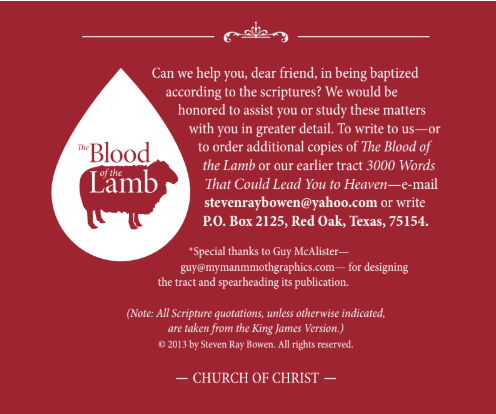
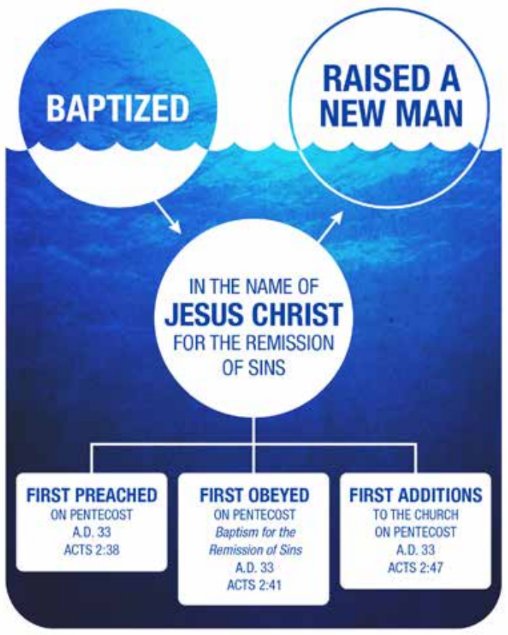
THE BLOOD OF THE LAMB takes us back to an old biblical truth: A sinner reaches the blood of Jesus (having his sins washed away), when he is baptized — immersed — into Jesus Christ. Somehow most denominations have lost this great truth. Due largely to influences from the Reformation Movement in the 16th century, men began teaching that salvation occurs before baptism, that baptism is no longer “for the remission of sins.” With the salvation of our souls at stake, we take another look at baptism and … THE BLOOD OF THE LAMB.